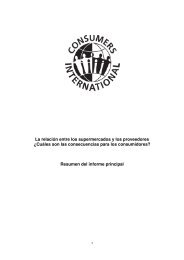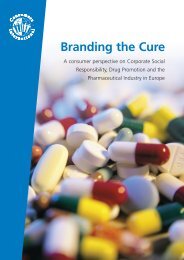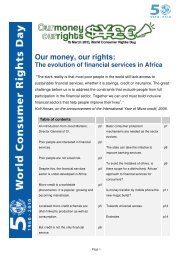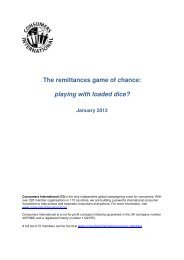Voices for Change: the Consumer Right to Representation
Voices for Change: the Consumer Right to Representation
Voices for Change: the Consumer Right to Representation
You also want an ePaper? Increase the reach of your titles
YUMPU automatically turns print PDFs into web optimized ePapers that Google loves.
World <strong>Consumer</strong> <strong>Right</strong>s Day 2002: <strong>Voices</strong> <strong>for</strong> <strong>Change</strong><br />
flooded by requests <strong>for</strong> input and commentary<br />
that require an expanding range of skills. The<br />
demand <strong>for</strong> increasing professionalism<br />
coupled with lack of training and chronic<br />
under-staffing can slow down progress.<br />
Ano<strong>the</strong>r challenge of consolidation is that<br />
original enthusiasms about consumer<br />
representation can flag in <strong>the</strong> face of practical<br />
experience. There are critical cultural and<br />
operational differences in <strong>the</strong> way that<br />
consumer and community groups function,<br />
as compared <strong>to</strong> government bureaucracies,<br />
professional organisations, industry groups<br />
and o<strong>the</strong>rs. Some differences stem principally<br />
from <strong>the</strong> discrepancy in funding and staffing.<br />
O<strong>the</strong>rs, like accountability, confidentiality and<br />
potential conflicts of interest, can be dealt with<br />
through <strong>the</strong> creation of mechanisms and<br />
guidelines <strong>for</strong> transparency and ethical<br />
conduct.<br />
10. Get training: Representatives are often<br />
“dealing with people who don’t necessarily<br />
want <strong>to</strong> listen <strong>to</strong> <strong>the</strong>ir point of view and are<br />
often sceptical of <strong>the</strong> representative’s aims,”<br />
notes <strong>the</strong> National <strong>Consumer</strong> Council (NCC,<br />
UK). Training can make a difference. Courses<br />
like <strong>the</strong> NCC’s A Stronger Voice and those<br />
offered by Australia’s <strong>Consumer</strong> Health<br />
Forum bolster general representation skills,<br />
including questioning and in<strong>for</strong>mationga<strong>the</strong>ring<br />
techniques, evaluation methods,<br />
negotiation and persuasion skills, strategies <strong>for</strong><br />
handling conflict, lessons in creative thinking<br />
and <strong>the</strong> like. Training possibilities <strong>for</strong><br />
representation work in campaign and<br />
advocacy areas such as legislation, utilities,<br />
food safety, trade/economics, using <strong>the</strong> law<br />
and o<strong>the</strong>rs are regularly offered by <strong>Consumer</strong>s<br />
International <strong>to</strong> its member groups.<br />
11. Measure success: It is easy <strong>to</strong> see when<br />
representation systems fall short of expected<br />
standards of openness and independence, or<br />
when <strong>the</strong>ir work is going wrong. But<br />
moni<strong>to</strong>ring and judging <strong>the</strong> substantive results<br />
of consumer representation is hard <strong>to</strong> do. It is<br />
relatively simple <strong>to</strong> record <strong>the</strong> activities of<br />
representatives and representative bodies and<br />
measure <strong>the</strong>ir outputs (e.g. numbers of<br />
meetings, submissions <strong>to</strong> decision-making<br />
bodies, public statements etc.), but <strong>the</strong>re are<br />
Effective Meetings<br />
It is a fact of life that representatives spend<br />
a lot of time in meetings. Here’s a checklist<br />
<strong>to</strong> make <strong>the</strong> most of <strong>the</strong>m.<br />
Be<strong>for</strong>e meetings:<br />
• Get <strong>the</strong> appropriate papers and make <strong>the</strong><br />
time <strong>to</strong> review <strong>the</strong>m;<br />
• Find out who will be attending;<br />
•Identify areas of common ground<br />
between you and o<strong>the</strong>rs in attendance<br />
and try <strong>to</strong> establish shared interests<br />
be<strong>for</strong>e <strong>the</strong> meeting;<br />
• Identify in advance key objectives <strong>for</strong><br />
relevant agenda items, using research,<br />
background in<strong>for</strong>mation, possible allies,<br />
key difficulties, desirable outcome,<br />
fall-back positions;<br />
• Note likely follow-up action.<br />
During meetings:<br />
•Know <strong>the</strong> rules;<br />
• Circulate your positions;<br />
• Request amendments or add agenda<br />
items if necessary;<br />
•Keep <strong>the</strong> committee <strong>to</strong> its objectives;<br />
•Make your points;<br />
• Record dissent;<br />
•Take notes.<br />
After meetings:<br />
• Reflect and evaluate;<br />
• Report back <strong>to</strong> your organisation;<br />
• Make or generate news based on<br />
meeting outcomes;<br />
• Collect new in<strong>for</strong>mation and follow<br />
up contacts;<br />
• Plan <strong>for</strong> <strong>the</strong> next stage.<br />
serious problems when it comes <strong>to</strong> evaluating<br />
influence on decisions and events.<br />
One reason is that <strong>the</strong>re are so many o<strong>the</strong>r<br />
fac<strong>to</strong>rs at work – consumer representation is<br />
only one input <strong>to</strong> a decision-making process<br />
influenced by a range of o<strong>the</strong>r interests and<br />
events. It is often impossible <strong>to</strong> determine what<br />
effect each player has had on <strong>the</strong> eventual<br />
outcome. Secondly, <strong>the</strong>re are often long time<br />
lags in policy-making, especially in law-making,<br />
27






![pkef]Qmf eg]sf] s] xf] < - Consumers International](https://img.yumpu.com/6479658/1/184x260/pkefqmf-egsf-s-xf-consumers-international.jpg?quality=85)
